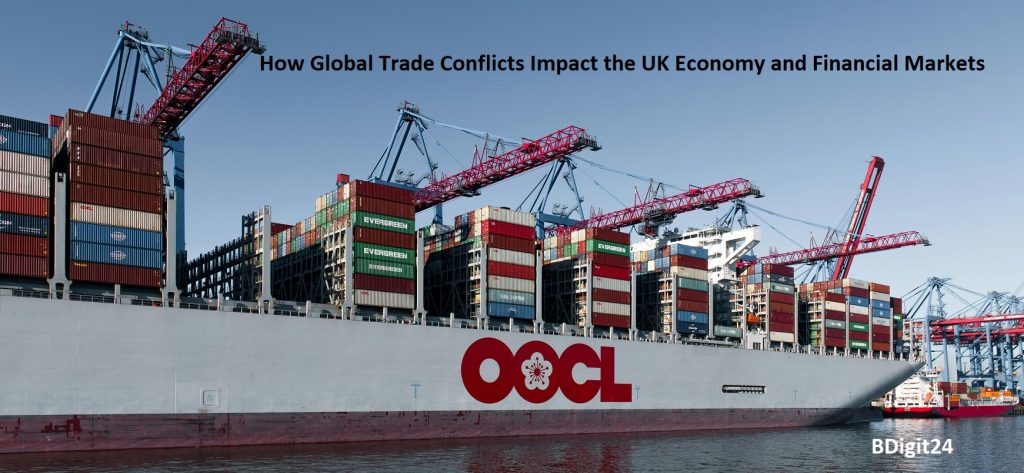How Global Trade Conflicts Impact the UK Economy and Financial Markets
Bank of England Governor Andrew Bailey has warned about the increasing risks posed by global trade wars, emphasizing their potential impact on the UK and global economy. Trade disputes between major economies, particularly the US and China, have already caused significant disruptions, with global trade expected to decline by 1.3% in 2024 (World Trade Organization). Bailey stressed the need for multilateral cooperation to minimize economic instability.
1. Understanding the Current Trade War Landscape
Trade wars occur when countries impose tariffs or restrictions on imports and exports, leading to retaliatory measures from other nations.
- Key Players in Ongoing Trade Wars:
- United States vs. China: Tariffs on electronics, steel, and agricultural products.
- European Union vs. US: Disputes over subsidies and technology regulations.
- UK vs. EU: Post-Brexit trade tensions, especially in financial services and manufacturing.
- Example: The US-China trade war resulted in $360 billion in tariffs being imposed, reducing global economic growth by 0.5% annually (IMF).
2. How Trade Wars Affect the UK Economy
The UK is a major trade hub, and disruptions in international trade can have widespread economic effects.
- Inflation and Consumer Prices: Higher tariffs on imported goods lead to increased costs for businesses and consumers.
- Impact on UK Exports: 26% of the UK’s total exports go to the EU, and trade barriers reduce profitability.
- Financial Market Volatility: Uncertainty causes investors to pull back, impacting the FTSE 100 and bond markets.
- Example: After the Brexit trade negotiations, UK-EU trade fell by 13% in 2021, affecting small and medium-sized businesses the most (ONS).
3. Bank of England’s Position on Trade War Risks
Andrew Bailey highlighted three key risks posed by escalating trade disputes:
- Economic Growth Slowdown: Reduced trade leads to lower GDP growth.
- Weaker Financial Stability: Currency fluctuations and investment reductions create instability.
- Consumer Financial Strain: Higher prices impact household budgets and savings.
- Statistic: The Bank of England projects that UK GDP growth could slow down by 0.8% in 2025 if trade tensions continue to escalate.
4. European Financial Markets’ Reaction to Germany’s Fiscal Shift
Bailey’s warnings came amid Germany’s recent fiscal policy changes, which caused a ripple effect in European financial markets.
- German government bond yields surged as investors reassessed economic conditions.
- European stock markets responded positively, anticipating greater economic stability with Germany’s new infrastructure investment plan.
- The euro strengthened, showing renewed confidence in European economies despite trade concerns.
- Example: The DAX 40 index, Germany’s leading stock index, rose by 2.5% following the fiscal policy announcement.
5. Potential Solutions and the Path Forward
Bailey urged policymakers to focus on international cooperation rather than unilateral actions.
- Multilateral Trade Agreements: Strengthening trade alliances can reduce tensions.
- Supply Chain Diversification: Businesses should reduce dependency on single markets.
- Government Support for Affected Industries: Sectors hit hardest by tariffs may need financial assistance.
- Example: The UK government’s recent investment in semiconductor production aims to decrease reliance on imports from Asia.
The risks from trade wars and their impact on the UK economy cannot be ignored. The Bank of England’s warnings highlight the need for proactive measures to safeguard financial stability. As trade policies continue to evolve, businesses, policymakers, and investors must stay informed and adapt to the shifting economic landscape.


